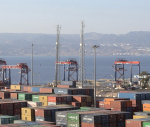You are here
Keeping Africa going up
Jun 05,2014 - Last updated at Jun 05,2014
Black Africa long went deeply down. Now it is rushing headlong up. But “up” brings problems of its own.
A country’s policy makers have to work as hard in successful, speedy, times as they did when they moved painfully from the first rung of the ladder to the second and third.
Take today’s news: according to the Financial Times, Kenya, one of the poster boys of the African revival, is now financially strong enough to make its debut on the sovereign bond market in a deal worth $2 billion.
But it has become entangled in a decade-old corruption scandal that cost Kenya $770 million.
The government has decided to take on the responsibility for paying off the $770 million in order to get the $2 billion (and future bond market loans).
In Mozambique last week, Christine Lagarde, the managing director of the International Monetary Fund, warned that the planned issuing this year of a total of $11 billion worth of sovereign bonds around Africa could overload economies with too much debt. (This is up from $6 billion a year ago and $1 billion in 2000.)
Lagarde warned African foreign ministers that “Africa rising” could be “spoilt”.
Although Africa needs the money for things like much needed infrastructure — ports, railways, hospitals and roads — borrowing gives governments “an additional vulnerability”. This is especially so when it doubles the salaries of civil servants, as Zambia recently did.
Standard and Poor’s, the rating agency, has told Zambia, Ghana and Nigeria — three of the states that have been top of the growth league — that it is now giving them a “negative outlook”.
Part of the problem is that Africa is a victim of its own success, argues Ravi Bhati, regional analyst at Standard and Poor’s.
As economic growth accelerates, “countries are sucking in imports causing the current account to post sizeable deficits”. Still the debt-to-GDP ratio remains far lower than the southern European countries.
On the positive side, much is going on.
The African Development Bank forecasts that foreign investment flows into Africa will rise this year to $83 billion, up by nearly a quarter from last year.
President Barack Obama is hosting a summit of 50 African leaders in August. He has invited the chief executives of both US and African companies.
He is aware that in recent years US investment has fallen in relation to that of China, India, Brazil, Turkey and Malaysia. US-African trade in the last decade has gone from $50 billion to $100 billion. But China’s has gone from 10 billion to $200 billion.
Africa is where much of the world’s economic action is. Yet the picture we watch can be rather clouded on occasion.
Foreign investment can have its flaws. One country to watch is China, Africa’s largest foreign investor.
Recently, Zhou Xiaochuan, governor of China’s central bank, warned that some Sino-African deals are “not so good, not so satisfactory”.
About 2,500 Chinese companies have established themselves in sub-Saharan Africa.
The Chinese premier, Li Keqiang, acknowledged during his first trip to the continent last month that the relationship between Beijing and African partners had suffered from “growing pains”. But he rejected accusations that Beijing was pursuing a neocolonial policy in Africa, seeking its commodities on the cheap, as some African leaders and news media have said.
Zhou made his comments after he signed a $2 billion deal with the African Development Bank, Beijing’s first departure from its “chequebook” policy of multibillion-dollar deals.
The new fund will open contracts to the most suitable bidder rather than just to Chinese companies.
There has been much criticism of its “chequebook” activities whereby money has been lent to African countries mainly to benefit China’s own construction groups, which have built everything from roads to hospitals.
There have also been complaints about the poor quality of some Chinese-built infrastructure projects and the use of migrant labour from China rather than using local labour.
Africa and its foreign investors have much to learn and much to be aware of. They must listen to the IMF, which casts a disinterested eye.
It is often said that Africa has nowhere to go but up. Long may it be so.













